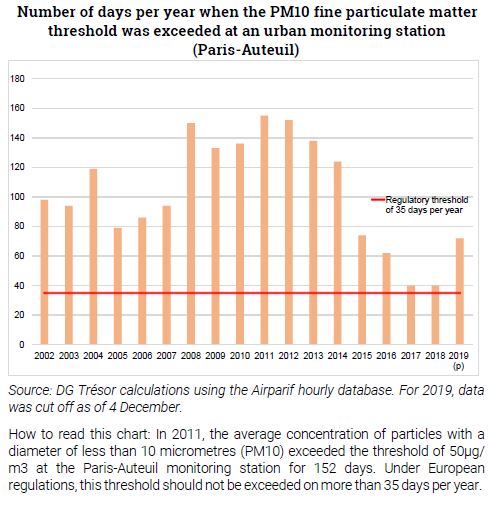How economic instruments can help fight air pollution
In France, the concentration of certain local air pollutants (in particular, fine particles, nitrogen dioxide and ozone) remains above regulatory thresholds. All sectors contribute to this, in particular heating and transport. Reducing this pollution requires a combination of economic incentives, regulatory measures and the development of alternatives, supporting low-income households and businesses whose competitiveness would be weakened.
Despite a sharp fall in emissions during the last two decades, the concentration of certain local atmospheric pollutants (which are different from greenhouse gases) in the air is still above recommended or regulated thresholds and there are recurrent pollution spikes in major agglomerations. Existing studies estimate the health costs of air pollution to be at least €20 to €30 billion per year, which represent at least 1% of gross domestic product.
Heating and transportation are major sources of pollution (in particular fine particulate matter and nitrogen oxides), especially in urban areas. This could be addressed through regulation (standards on open fires and heating appliance efficiency), development of public transport networks or enhancement of economic incentives (through congestion charge schemes, taxation of trucks on the French road network).
Industry, energy generation and agriculture are also high-emitting sectors, particularly for fine particulate matter, sulphur dioxide and ammonia. In addition to awareness-raising campaigns to alter behaviour, sending out an incentive price signal by bolstering the general tax on polluting activities (TGAP) and introducing a new instrument on nitrogen mineral fertilisers and pesticides would spur a reduction in these emissions.
Owing to the adverse effects of a number of these measures on households' purchasing power and businesses' competitiveness, flanking support provisions for the most vulnerable economic agents should be provided.
Better measuring of air pollution and its repercussions is also required as are improvements in governance. Taking better account of specific contexts could be achieved, inter alia, by reinforcing the local steering of air protection policies.
